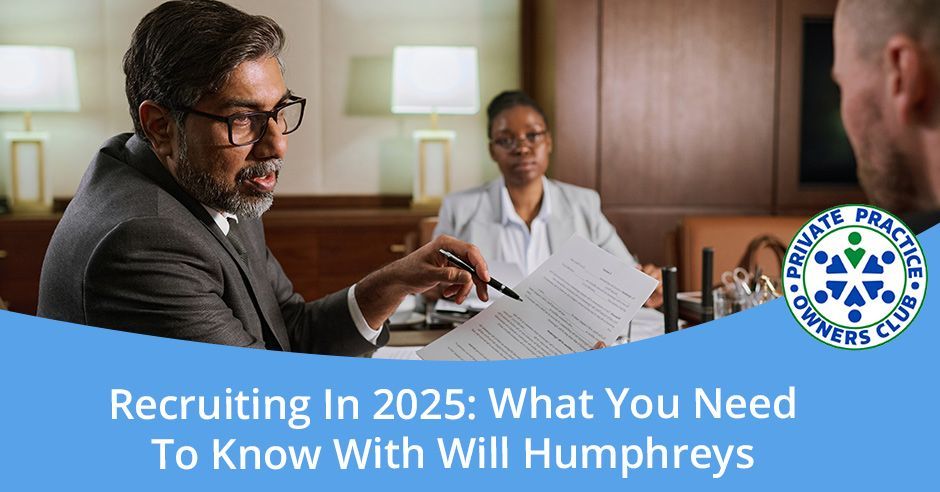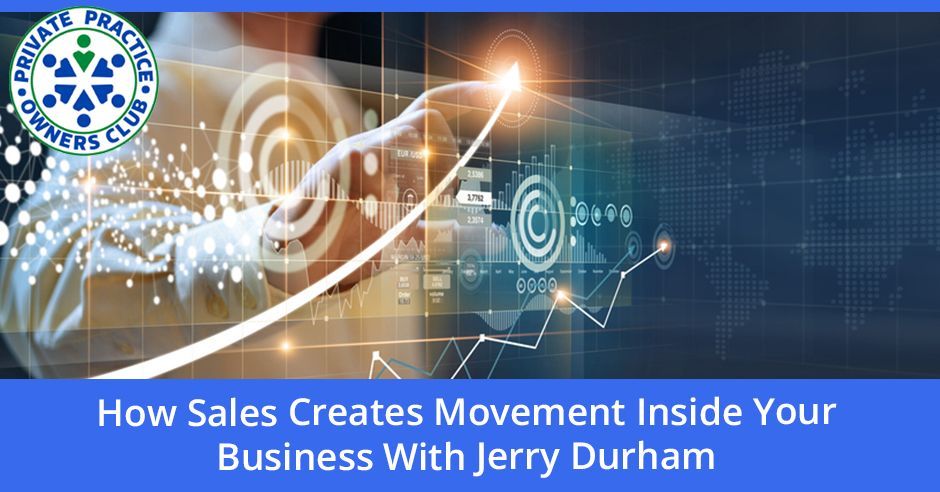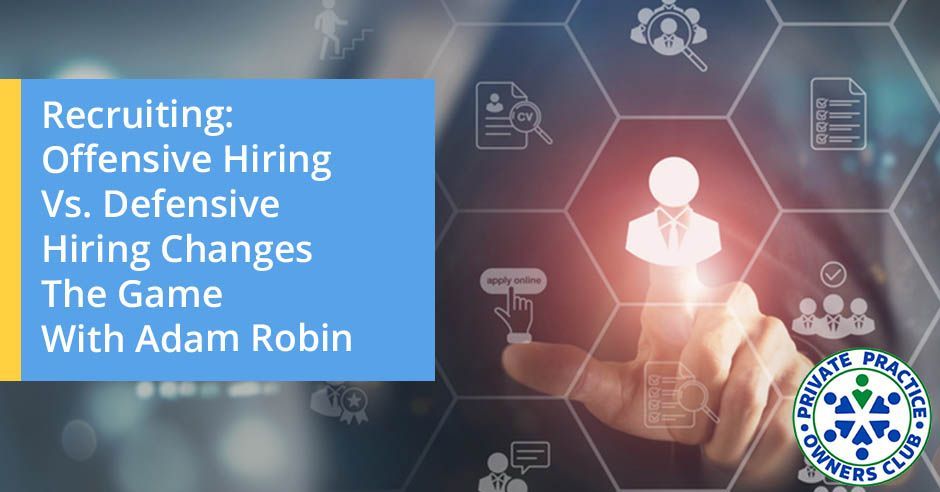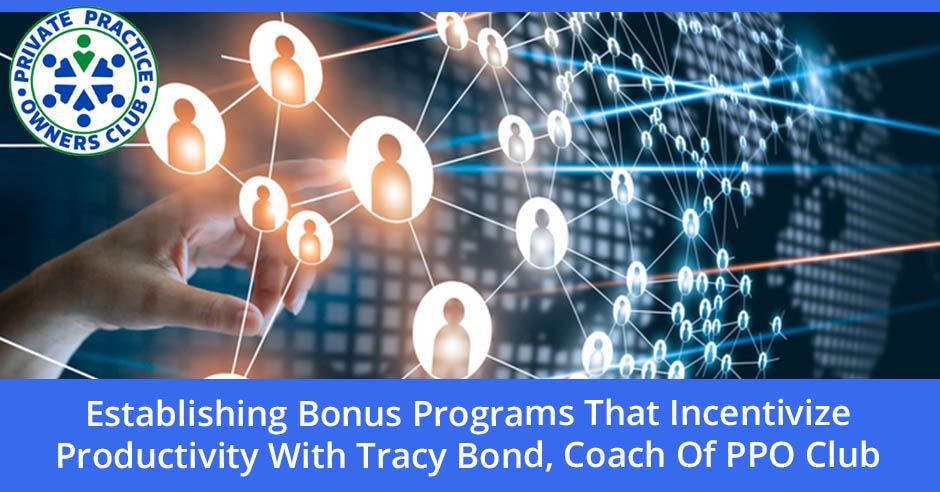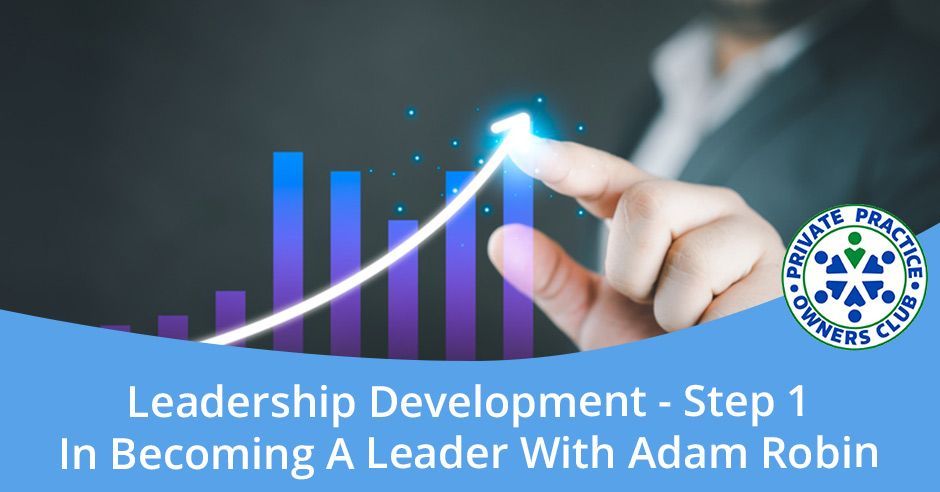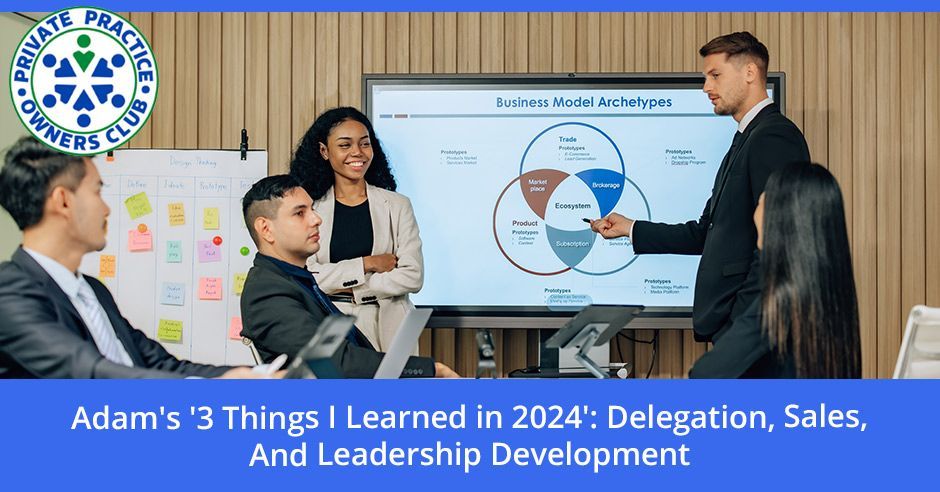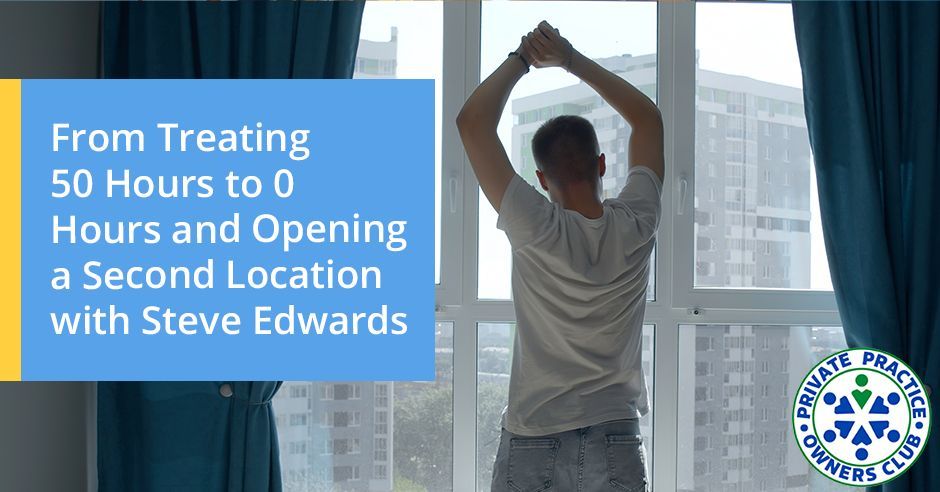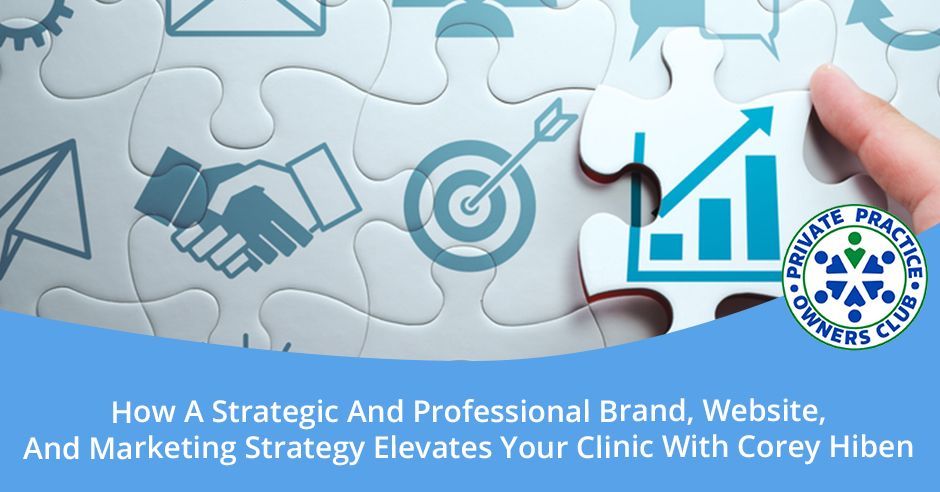Most private practice owners don’t have a recruiting problem—they have a lead generation problem. If you’re struggling to hire top talent in 2025, this episode is the shift you’ve been waiting for.
In this episode of the Private Practice Owners Club podcast, Adam Robin sits down with recruiting expert
Will Humphreys to talk about the evolving world of hiring in 2025. Together, they share practical tools, personal stories, and powerful mindset shifts that can transform how you attract and retain great people.
If you’ve ever felt stuck, overlooked, or frustrated by the hiring process, this conversation will show you what actually works—and what most private practice owners are getting wrong. From the power of LinkedIn to the magic of defining your “ideal hire,” you’ll leave this episode equipped and inspired.
Episode Highlights:
• 𝗥𝗲𝗰𝗿𝘂𝗶𝘁𝗶𝗻𝗴 𝗶𝘀𝗻’𝘁 𝗷𝘂𝘀𝘁 𝗮 𝗯𝘂𝘀𝗶𝗻𝗲𝘀𝘀 𝘀𝗸𝗶𝗹𝗹 —it’s the only skill that scales everything else in your business.
• 𝗬𝗼𝘂 𝗺𝘂𝘀𝘁 𝗱𝗲𝗳𝗶𝗻𝗲 𝘆𝗼𝘂𝗿 𝗶𝗱𝗲𝗮𝗹 𝗵𝗶𝗿𝗲 𝗯𝗲𝗳𝗼𝗿𝗲 𝘆𝗼𝘂 𝗲𝘅𝗽𝗲𝗰𝘁 𝘁𝗵𝗲𝗺 𝘁𝗼 𝘀𝗵𝗼𝘄 𝘂𝗽 —clarity is the first step.
• 𝗠𝗼𝘀𝘁 𝗰𝗹𝗶𝗻𝗶𝗰𝘀 𝗱𝗼𝗻’𝘁 𝗵𝗮𝘃𝗲 𝗮 𝗵𝗶𝗿𝗶𝗻𝗴 𝗽𝗿𝗼𝗯𝗹𝗲𝗺; 𝘁𝗵𝗲𝘆 𝗵𝗮𝘃𝗲 𝗮 𝘃𝗶𝘀𝗶𝗯𝗶𝗹𝗶𝘁𝘆 𝗽𝗿𝗼𝗯𝗹𝗲𝗺 —LinkedIn is your secret weapon.
• 𝗦𝘂𝗰𝗰𝗲𝘀𝘀 𝗶𝗻 𝗿𝗲𝗰𝗿𝘂𝗶𝘁𝗶𝗻𝗴 𝗰𝗼𝗺𝗲𝘀 𝗳𝗿𝗼𝗺 𝗰𝗼𝗻𝘀𝗶𝘀𝘁𝗲𝗻𝘁 𝗼𝘂𝘁𝗿𝗲𝗮𝗰𝗵, 𝗻𝗼𝘁 𝗹𝘂𝗰𝗸 —volume and service are the keys.
• 𝗥𝗲𝗰𝗿𝘂𝗶𝘁𝗶𝗻𝗴 𝗶𝘀 𝗹𝗲𝗮𝗱𝗲𝗿𝘀𝗵𝗶𝗽 —and leadership is service. Detachment from outcomes lets you serve better and attract the right people.
Struggling to find the right PT, front desk, or office leader? It’s time to stop spinning your wheels and start using the tools and systems that work. Whether you’re a solo practice owner or scaling across multiple locations, this episode gives you the game plan to recruit with confidence.
Visit our Linktree for Coaching Services, Free KPI Dashboard, Facebook Group, and Strategic Planning Tools:
https://go.ppoclub.com/linktree-podcasts
Love the show? Subscribe, rate, review, and share:
https://ppoclub.com/
---
Listen to the Podcast here
Recruiting In 2025: What You Need To Know With Will Humphreys
In this episode, we're going to talk about recruiting. I am going to interview the one and only
Will Humphreys. He's the guy, he's the legend, but he's also somebody that I love to connect with on a regular basis because we both love recruiting. It's a passion. It's something that fires us up. Every time we get together and talk about recruiting, we always feed off each other's energy.
I want you to settle in. We're going to jump into a powerful conversation about recruiting in 2025, what you need to know, and what you need to start executing on in order to stand out and attract quality candidates to your place. Grab your pens, grab a piece of paper, take some notes, and let's get to work.
Will, what do you think about recruiting?
The Core Belief: Recruiting Solves Everything
Recruiting is the only thing we have to master in our businesses. In my opinion, and you'll get on board with this, if people focus on mastering recruiting, they wouldn't have to solve any other problem. That's what I think about. Alex Hormozi says this. There are dumpster fires and there are house fires. They realize that some of those fires need to burn. If the only one that matters the most is recruiting and retaining talent, then they would shift their world so much faster, even though in the short-term, it might be painful. If they could hire talent, there's nothing they can't do.
Recruiting is like the art of finding things. In this case, it's talented people who align with you. If you're trying to find customers, employees, a wife, or a spouse.
I love that you said that.
Opportunity comes through people. Don't seek opportunity. Seek the people with whom you align, and then the opportunity comes after. That's how I view it. That skill of being able to find these people who align with you is a never-ending thing. You'll never run out of opportunities if you can find people.
The "Mary Poppins" Story – Recruiting In Real Life
Amen. If you don't know how to run your company, you can hire a CEO. If you don't know how to find new patients, you hire a marketer. The only talent that's necessary is recruiting. To illustrate your example, we had an experience during COVID. We went to Europe for six months after I sold. I came back, starting my new career when COVID hit.
All the schools were shut. My two younger kids had been homeschooled by my wife and me for six months in Europe. We came back and were like, “They're going to miss out on education.” To all you parents who had kids during Covid, you'll remember that time when you had to homeschool your kids all of a sudden. You were either good at it or not, and then your kids are behind if not.
I have already been bought into this whole recruiting concept that you and I are talking about. The first thing I did was sit down and write my avatar. I said, “Heather, we're going to find a teacher.” She's like, “What do you mean? We can't afford a teacher.” I'm like, “We don't know until we write down our ideal scene. Let's sit down and detail out this avatar process,” which I've taught in Rockster Recruiter forever. I got it from a marketing firm years ago that I tweaked for PT and all these things.
In that process, we invented the perfect solution. It was going to be this expert teacher who didn't need to work a lot but still wanted to work with highly gifted and talented kids. My youngest son, in particular, is incredibly talented. We needed a high-level teacher, but we didn't want to pay a lot of money because we weren't making a lot of money since I sold my business. Meaning, I wasn't making any money. We cut all those variables and dreamed this person up.
We called her Mary because we imagined someone like Mary Poppins. We wrote up her fears, her hopes, her dreams, and her current situation that would align with our situation. I created an ad and put it out on all the different places you can put ads. There weren’t a lot of responses. We got 4 responses, but we interviewed 3 of those 4.
The third and last woman was Mary. Her real name was Laura. Miss Laura came in with an English accent like Mary Poppins. She came in and she was perfect. She had this extensive background with teaching the gifted and talented. She identified some pitfalls for my kids that if they had gone through the public system, it would've destroyed one of my kids. She was loving. She taught them for two years.
At the end of the 2nd year, my son, who was in the 5th grade, was doing senior-level calculus. It was an early introduction to calculus. To this point, they don't even try since they’re back in the school system. They get straight As all because of Miss Laura because we knew how to recruit. To illustrate finding a wife, that was my first indication that I was good at recruiting. I married way above my means. I realize that was my indication that I knew how to recruit.
I like how you bring it to the avatar. What I heard you say is that you defined what you wanted.
It's the second step, in my opinion, and it's the most missed of all the steps.
The Mindset Shift & Power Of Defining What You Want
I wrote down, “You get what you're looking for.” It’s like, “Yeah, but there are no PTs to hire. Yeah, but this. Yeah, but that.” What do you want? It’s like when you want the red Corvette. You know how it goes. I don't remember what law it is. I'm sure you'll remember it.
I don't remember the name either, but I know where you're going. Keep going.
Nobody has a red Corvette, but then, when you buy the red Corvette, you see ten of them the next week. Right. You get what you're looking for. The way that I like to do it is, “Here's your magic wand. What would you create?” I don't know what it is about that, but when we define it, it becomes possible for some reason. Once you can see it, it becomes possible. For me, I start feeling this rush of optimism, creativity, and possibility once I define the ideal outcome. In this case, it's the avatar. Sometimes, the world will start giving that to you if you ask for it.
That sounds so ethereal, but people who are in the marketing or recruiting space who are into it talk about it as if the sky is blue. I know how ethereal that sounds to our readers who are all sitting there going, “It's hard.” Will and Adam don't understand that I'm in a rural area. They don't understand that I have to compete with hospitals in my area. They don't understand that the reimbursement in my state is bad. They don't understand that I'm in Alaska. They don't understand.
We have helped probably every state in this country recruit successfully. I said there were steps. That first step is mindset. It has to do with what we want. Everyone is capable of going into that scarcity mindset that you described, and our industry perpetuates it. It gives all sorts of facts that would justify keeping it, like more people are leaving the industry than entering, and reimbursements are going down. That is going higher for students. That's what's so exciting about it. 99% of all PT, OT, and SLP medical entrepreneurs buy into that and live in that space. The few of the proud are the atoms of this world.
It makes it easier.
Control What You Can: Eliminate Excuses, Focus On Solutions
They are like, “I believe I can do something. I believe that we will win.” They go in with that mindset. They draw up the dream and put it on the mirror. Whether it's the universe or our subconscious being directed that way without us knowing because we're putting positive attention on it, or whether it's us figuring out a step in this process, I don't even know. It works. You put that crap out there and believe in it. We stop saying, “It's impossible or hard to recruit.” We say, “I struggle with currently.”
If we can't control something, we don't talk about it—we just solve the problem.
Another thing Alex Hormozi says that I love is, “If we can't control it, we don't talk about it.” Meaning, if we can't control tariffs, we don't talk about the tariffs when it comes to recruiting. It's not that we don't think about it as owners. We stop feeding into that stuff. During COVID, that was his big thing. He had a company called Gym Launch where 100% of his clients were legally unable to keep their doors open. His $32 million business went down to $31 million that year. He says that was his greatest accomplishment in his life. They can't control COVID, so they don't talk about COVID. They solve the problem.
I would love to hear your perspective. If you're looking for PT, let's assume the mindset is right, for the most part. Let's say the avatar is right, for the most part. The job ad is written, but there are still no applicants. What's your go-to? It’s like, “I need to find 2 or 3 people who would be interested in potentially working for me.” How do you do that?
Leveraging LinkedIn For Effective Recruiting
There's the global answer and a short answer. I have been doing Rockstar Recruiter for four years. Twice a month, I'm on calls with PTs across the country. We're only talking about recruiting. You knew I had my summit on that. I'm hyper-focused on this space. What I have learned and taught back in the day, when I was first teaching my clients all these things, has evolved.
What I've created is a concept that we are finding is getting traction. It's a long-term strategy that changes the game. The short-term answer is something that you're very good at, which is leveraging LinkedIn. There is no more powerful tool for a quicker response. This isn't just physical therapy. I was at a conference where they were talking all about this, that LinkedIn is the path. There are so many ways that we can leverage our time and assistance time to get on LinkedIn, make connections, build connections, and then let them know about us.
I hope you agree with this. My opinion is that everyone tuning in who's struggling with recruiting and talent doesn't have a recruiting problem. They have a lead generation problem. Most of our clients do well when they show up. When the PTs are showing up for the interviews, they do good on sales, closing, and all the things. They might suck at retention, but they're good at recruiting. They suck at generating leads for people to even know they exist. LinkedIn is the quickest way, in my opinion, to solve that.
Mastering Cold Outreach For Successful Recruiting
I agree. It's a cold outreach component of it. I had an interview. I offered a PT a job. I was hopeful that he would join our team, but he declined. He ended up taking a job in Texas. I do my little walk up and down the road. He was like, “I'm not going to take the job.” I was like, “That's awesome. I'm curious. What was it that was missing?” He said, “The salary wasn't quite there.”
I thought you were going to go there.
I said, “That's a good reason. You should go.” In my mind, I think to myself, “That's a bummer,” but what I did was I ended my walk, sat down in my garage, pulled up my phone, and sent 25 text messages. I got four phone calls scheduled next week.
Let’s go. You built that. How did you get those numbers? Maybe share with the audience because this is the key thing you're talking about. What was your initial action that got you to those four numbers that you could text?
I made a commitment that I was going to try to meet and have a conversation with any PT who'd be willing to talk with me, and I was going to save their name and phone number and put it in my phone. I made that the game. How many phone numbers could I put in my phone? It’s like, “Will Humphreys PT. Nathan Shields PT. Adam Robin PT.”
I can go to my phone, type in PT, and start scrolling. I've got 300 of them. I can start sending text messages. I’d be like, “I haven't heard from Will in a while. I haven't heard from Nathan in a while. What's going on? What's up? It's been six months. What's new?” With the power of the phone, you could schedule messages. You can send voice memos to people.
Video messages, everything.
That's the cold outreach that can be automated. I've had powerful responses to doing that, checking in on people and asking for conversations.
What Adam is highlighting is so brilliant. I want to highlight that again because you answered your own question, in my opinion. There's LinkedIn, but what's the point of LinkedIn? It's to get to that point where you're having con conversations.
The Speed of Trust is the best book ever written for business owners, in my opinion. It talks about how when we have trust with people, we move quickly with them. You can't have trust without communication. The closer to those two points, the higher the trust builds quickly.
It is changing recruiting from this thing of posting an ad and feeling like I suck at it to, “How many people can I serve?” That's the only thing I'd like to add to that. What Adam does organically, because you're reading and you may not be picking up on it, is that he doesn't call to get something from them. He's gamified it for him to get as many numbers of people as he can be in connection with. I know Adam. When he is on that call, it's like, “Who are you? How can I help you?” That's why he's calling.
When we start recognizing that the solution for recruiting is leadership and the key element of leadership is service, that's when the game shifts. Every one of the people in the audience is good at service. They're huge-hearted people who have been invalidated with every fire, every no-show, and every person who says, “I want to take more money.”
The truth is, no one's more apt or capable of recruiting than these people who are tuning in to your show. They love well, but they don't know how to serve the audience the way that Adam does. When you're talking about loving, serving, and getting those phone calls, that's what you're doing. When you reach out and you're like, “I need conversations because I'm looking for something,” they love, like, and trust you. That is so brilliant.
I like that approach. To me, I do look at it as service, but the mindset that I have is I'm detached. I don't care if you work for me or not. I'm not clingy to the idea of you working for me.
You're not reaching out to get something from them. You're not getting them to hire. That's not the product of your call.
Asking For What You Want
I also think that we need to get better at asking for what we want. There's no place to get until there is, right?
Yeah, I love that.
“Who makes the most sales?” It’s the person who pitches the most.
It is who puts forth the most effort.
How do we ask for what we want without being demanding? It’s like, “It's been six months. My interest is to make sure that you are completely happy with where you are, but we do have something that came up. If you're remotely interested in having to see what that is, I'd love an opportunity to connect. What do you think? Where should we go from here?” Ask for what you want, like, “I'd like to have a conversation. I could use your support around that.” If we get better at asking, especially if we identify what we want and we get better at asking for it from a place of service, that is recruiting.
When we start recognizing that the solution for recruiting is leadership and the key element of leadership is service, that's when the game shifts.
Rejection & Mindset Of Service
Here's the thing that you're saying. We oftentimes think that the ask is separate from the service. What if asking them to come work for you was the greatest way you could serve them? When we connect those dots is when our mindset shifts. We're not afraid to get rejected. At the end of the day, whether people know it or not, the thing that's limiting you is the fear of rejection.
Everyone who's reading has been fired way more than they've ever fired anyone. Every time we quit, we get fired. That is a deeply hurtful, impactful, and painful experience. Every time an employee says, “You only care about the money,” we get attacked more than anyone else. Elon Musk says that owning a business is like staring into the abyss of the unknown of what could happen and what might scarily happen while we're chewing glass in real-time.
When we want to reach out to people, that pain is real. What if we approached it from a mindset of service and said, “What if my role in reaching out to getting these numbers is about trying to help as many PTs be the best they can be in their career?” I was hiring, at one point, for 26 locations. It was me and Tone Williams. We hired for every office position in 26 locations.
The number one thing I got feedback on was, “Will, when you said, ‘My job is to help you find your next job, whether it's with me or somebody else,’ they said that was the one thing that drew them in. It wasn't a tactic. I used to say that for me, not for them. Every interview, I'm painfully aware of what's at risk. I have to hire this person or life will suck. What I do is I'd say that in the interview to get my mindset right, like, “Let’s help this person find their home.”
What it did was set me up for a powerful ask. I knew it was me because I was in that mindset. When I'm in a place of scarcity and I'm trying to hire people, I never know if it's a good fit. I'm desperate for them to say yes, which is why we hire unaligned talent. When I'm in that mindset of, “I want to help you go home,” and I know it’s me, forget it.
I’ve done this before in interviews where I’m like, “You know what I said earlier. You have to work for me. You would love it.” That's where we get the power for the ask. It's not separated from the service. Asking is service when it's the right person. We don't know who the right person is until we serve everybody. That goes back to your point.
One of the things that you said that I want to highlight that was so brilliant is repetition. At the end of the day, if you're struggling in that mindset, go with the mindset of, “I'm going to detach myself and ask. I know that most people are going to say no.” In my case, it only took one yes from the most beautiful woman in the world for me to make all the noes, all the heartbreak, and all the rejection from the years before worth it. That was many years ago. For us, it's no different in recruiting.
It can beat you down because you're going to get some rejection. The truth is, they're not saying no to you. They're saying no to the opportunity, or they’re saying no to the thing. They're not saying, “Will, I don't like you.” They're saying, “That opportunity doesn't interest me right now.” Being able to detach from that rejection, that's how I go about that.
What happens whenever we approach a candidate? Their guard is up. They're like, “Who's this Will guy that keeps sending me a DM?” The fight or flight is up. They're suspicious, which is natural. What if somebody was stalking you? Would you be a little suspicious? I'd be a little suspicious. Our job is to help disarm them and to help them realize, “It's not what you think. It's something a little different. I'm here to serve.”
“Once the guard comes down, we can have a productive conversation about what's most important to you. I’ll see if I can help.” I love that language that you use, like, “I'm here to help you find your dream job,” because what it does is it helps decompress the room and disarm the candidate so you can find out the best way to serve them.
I love that. What a cool recognition of the biology of someone in the sales process. It's so powerful in that regard, and recognizing that there's a need to detach. It's a tough game. We care so much, which is why we're successful, but we can't care about being rejected in those early stages of recruiting. We'll never get done. We have to be okay with the fact that some people, no matter how well we try, aren't going to see the vision of what we're doing.
This is the big message I want to leave with this episode. It’s the idea that if they try anything consistently for fifteen minutes a day. They could be on LinkedIn for fifteen minutes. I know they can work with your wonderful recruiting programs to learn what to do in those times. They have to do it. They need 15 minutes a day and 1 hour a week. Spend that time.
Never give up. You can do this—you just don't know how yet.
Whatever you put, be consistent with it. In time, it will immediately make an impact. It will change the way we think. It will shift how you recruit because you never give up. In the recruiting game in physical therapy, if there's one tattoo I would give to everyone for free across their forehead, it would be, “Never give up.” You can do this, but you don't know how. Working with you and your program, learning those steps, and then for them to stick with it, that is how they win.
Everyone else has given up. 99% of our industry puts the urgency out in those rare moments where they don't have any other choice because their backs are against the wall. What if you did it every time, whether your back was against the wall or not? You become this amazing leader who has multiple locations, and you sell. That's what happens. It's that man in the mirror moment. You’re like, “What kind of leader do I want to be?”
Consistency & Volume In Recruiting
You've got to push through that discomfort, too. Have you ever read any of Jeb Blount’s stuff?
No.
He wrote a book called
Fanatical Prospecting. It’s a great book. If anybody wants to learn how to recruit, read that book.
I'll check it out.
What Alex Hormozi talks about is the rule of 100. You do 100 outreaches for 100 days. The big takeaway that I'd like to leave is that if you're trying to generate leads, volume negates luck. Send 100 DMs for 100 days. If you do that, if you look for it, you'll start finding it. I can't tell you how many times I've had people join our coaching program who are like, “I can't find a PT,” and then we teach them volume negates luck, and within a week, they find they have found three PTs. It's a mindset shift. We massively underestimate the amount of volume and intensity that we have to put into that lead generation bucket to move the needle.
When you realize it's challenging for the entire industry and the only person who wins is going to put that volume of work in, it gives some luck and some opportunity. Go back to creating that ideal person first. That's what's cool. When I've coached people for that, my favorite thing ever was, “Will, I found Mike,” if Mike's the name of the avatar. His real name is Dale or something. When they say, “I found Mike,” that gives me the warmest feeling because that means they've done two things. They shifted their mindset into what they want, defined what that looks like, and then put enough volume to negate any luck involved.
Also, they've gotten good at repetition.
Finding The Right Fit
Good at failing, too. They've gotten used to, “You don't want to respond. Fine,” or, “You want more money. Great.” At the end of the day, getting that amazing fit makes it all worth it.
I know most know you. You do all kinds of cool stuff. You've got the Virtual Rockstar stuff. You do recruiting stuff. How do people get into your world? How do they find you?
They're more than welcome to listen to my podcast,
The Willpower Podcast. I am very happy to give free information there. I've got social media channels. In terms of things that I do, the Virtual Rockstar space and the virtual assistant piece are my main things. I am working with companies to help them find virtual assistants to free them up. My purpose has become to free you up. I live in that space.
I do have some recruiting training. It's not something I'm promoting, to be honest. You and I worked so closely over the years. If there's any recruiting help, I would ask that they go to your services because I believe in what you do. I've said this privately to him, but I feel like I'm not serving him unless I say it publicly. Adam is the person who has unlocked these things in a way that has inspired me.
In a lot of ways, but recruiting in particular, Adam and I are the only two that I know in the space who know this as well as we do. He is passionate about helping you serve and help in that area. If you're looking for virtual assistants and you're looking for general guidance and information, you've got my podcast and my website,
VirtualRockstar.com. If you're looking for recruiting help, my boy Adam is the man to go to.
Thanks. I'll plug Will as well because he's also got a billing company.
We're not accepting clients right now, unfortunately, but we do.
I've worked with Will in his billing company, and it was incredible. It was impeccable. The guy is good at what he does. I haven't worked with him on the VA stuff, but I know it's top-notch. The guy knows what he's doing. Reach out to Will for any questions.
The reason I like the virtual assistant thing, to be honest, was that it was me getting to serve and recruit someone, versus teaching them. What I learned is that I'm decent at teaching, but I'm not as good, in my opinion, as you are at teaching concepts. I got more value from providing virtual assistants for people who don't want to figure it out. It’s very easy to figure out on your own.
For people who are like, “I want to mess with it,” that's who I get to help. It's been so fun. You and I are both in that recruiting space, but we synergize well together to help this industry. Adam and I are both committed to helping you guys not be so freaking busy all the time, to be honest. At the end of the day, that's what we want.
Let's do this again in the future. I always enjoy this.
Me too. It’s such a pleasure. Thank you guys for tuning in.
Talk soon.
Bye.
Important Links
About Will Humphreys



